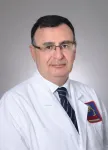(Press-News.org) In an era when online misinformation is seemingly everywhere and objective facts are often in dispute, UC Berkeley psychologists in a new study have presented a somewhat paradoxical partial solution: Expose young children to more misinformation online — not less.
Doing so in limited circumstances, and with careful oversight and education, can help children gain the tools they'll need to sort fact from fiction online, said Evan Orticio, a Ph.D. student in UC Berkeley’s Department of Psychology and lead author of a paper published today (Thursday, Oct. 10) in the journal Nature Human Behaviour.
Orticio argues that, given children’s natural skepticism and early exposure to the internet's boundless misinformation, it is crucial for adults to teach them practical fact-checking skills. Instead of attempting to completely sanitize their online environment, he said adults should focus on equipping children with tools to critically assess the information they encounter.
"We need to give children experience flexing these skepticism muscles and using these critical thinking skills within this online context in order to set them up for their future, where they're going to be in these contexts close to 24/7," Orticio said.
Orticio and his colleagues used a pair of experiments involving 122 children ages 4 to 7 to test how their level of skepticism changed in different online environments.
The first study exposed them to an e-book with varying degrees of true and false statements about animals. Next to a picture of a zebra, for example, some children were shown truths, like that zebras had black and white stripes. Others were shown falsehoods about zebras being red and green. Based on that information, they indicated whether the claims were true or false. A second study simulated search engine results and posed similar animal facts and fictions.
Next, children evaluated the veracity of a new claim within that same digital context, this time about an alien species called Zorpies. On a screen were images of 20 so-called Zorpies. One of the alien's faces showed that it had three eyes; the rest of the Zorpies wore dark sunglasses that obscured their eyes.
Children were then asked to decide whether all Zorpies had three eyes. But before making their final decision, participants were allowed to fact-check the claim by tapping any number of the aliens, removing their sunglasses and revealing their eyes. Since children knew nothing about the aliens, their skepticism could only come from their assessment of how reliable this digital platform was.
Researchers found that the children who were the most diligent about fact-checking the Zorpies claims were also the ones who saw more false claims about animals earlier in the study. Meanwhile, those who had more reliable environments with fewer false claims earlier in the study did almost no fact-checking. A computer simulation confirmed that the children in the more unreliable environments were more likely to debunk potential misinformation.
"Children can adapt their level of skepticism according to the quality of information they've seen before in a digital context," Orticio said. "They can leverage their expectations of how this digital environment works to make reasonable adjustments to how much they trust or distrust information at face value — even if they know next to nothing about the content itself."
The project was born from an urgent need to understand how children are faring in an increasingly online world. Previous research has found that an estimated one-third of children have used social media by age 9, and that minors encounter health misinformation within minutes of creating a TikTok account.
Even platforms that are purportedly curated for young audiences, like YouTube Kids, have become spaces for toxic content and misinformation. That's a particular problem, Orticio stressed, because parents may have the impression that these are safe places their kids can explore.
But as the new research shows, that may give a false sense of security and allow falsehoods and problematic content to go unchecked and be taken as true and acceptable.
"Our work suggests that if children have some experience working in controlled, but imperfect, environments where they have experience encountering things that aren't quite right, and we show them the process for figuring out what is is actually true and not, that will set them up with the expectation to be more vigilant," Orticio said.
Orticio knows that not every parent has time to constantly monitor a child's media habits. Rather than trying to create the most sanitized corner of the internet, he said parents should have discussions with their children about how to check claims and to talk about what they're seeing.
Having clear expectations about what a platform can and can't deliver is also important.
"It's not that we need to enhance skepticism, per se. It's that we need to give them the ability to use that skepticism to their advantage," Orticio said. "In our experiments, fact-checking was very simple. In real life, fact-checking is actually very hard. We need to bridge that gap."
END
To make children better fact-checkers, expose them to more misinformation — with oversight
"We need to give children experience flexing these skepticism muscles and using these critical thinking skills within this online context," a UC Berkeley psychology researcher said.
2024-10-10
ELSE PRESS RELEASES FROM THIS DATE:
Renowned psychiatrist professor Celso Arango advocates for primary prevention in mental health
2024-10-10
In a revealing Genomic Press Interview published in Brain Medicine on October 10, 2024, Professor Celso Arango, a prominent psychiatrist and researcher, outlines his vision for the future of mental health care. Professor Arango, who serves as Director of the Institute of Psychiatry and Mental Health at Hospital General Universitario Gregorio Marañón and Professor of Psychiatry at the Universidad Complutense de Madrid, advocates for a paradigm shift towards primary prevention in psychiatry.
Professor Arango's career trajectory, from his early exposure to ...
Ketamine pioneer Dr. Carlos A. Zarate Jr. reshapes depression treatment landscape
2024-10-10
Bethesda, Maryland - 10 October 2024. In a revealing Genomic Press Interview published on 10 October 2024, Dr. Carlos A. Zarate Jr., NIH Distinguished Investigator and pioneer in rapid-acting antidepressant research, offers a glimpse into the personal motivations and scientific breakthroughs that have defined his career. The interview, part of the journal's Innovators and Ideas series, showcases Dr. Zarate's journey from a young tennis instructor in Argentina to a leading figure in psychiatric research at the National Institute ...
Glowing approach could aid carpal tunnel-related surgery
2024-10-10
In modern office life, avoiding the onset of carpal tunnel syndrome might be a daily struggle. The worst case could mean needing surgery to alleviate compression of the nerves or to repair damaged nerves. Helping surgeons visually check the areas where neural blood flow has decreased due to chronic nerve compression can lead to improvements in diagnostic accuracy, severity assessments, and outcome predictions.
With this in mind, an Osaka Metropolitan University-led research team involving Graduate School of Medicine student Kosuke Saito and Associate Professor Mitsuhiro Okada investigated the use of fluorescein angiography, a method employed in neurosurgery and ophthalmology ...
The hidden costs of free apps – more than personal data
2024-10-10
Procrastination, sleep deprivation and reduced focus are part of the price we pay for free mobile apps. This is according to researchers at Linköping University and RISE, who have investigated the costs hidden behind the free apps. Based on their results, they also have some advice for decision-makers.
Most of us are becoming aware that our digital attention is hard currency for companies like Google and Facebook. By analysing our digital behaviour patterns, they can target tailored advertising directly to our feeds. Our attention becomes the product that is sold to advertisers. For example, YouTube’s three billion monthly users generated ...
Hot dragonfly summer: species with darker wings have evolved to withstand heat and attract partners
2024-10-10
Temperature determines where species can live and if they are threatened by a warming climate. So, for a long time, biologists studied how heat tolerance affects survival. Yet, less is known about how thermal traits influence reproduction, which is directly linked to extinction risk.
Now, researchers in the US have examined if males of dragonfly species that produce sexual signals in the form of dark coloration on their wings are more resistant to heat. They published their results in Frontiers in Ethology.
“We show that dragonfly species that have evolved dark breeding coloration on ...
Development of a new electrolyte synthesis method for next-generation fuel cells: a step closer to green hydrogen production
2024-10-10
Dr. Ho-Il Ji from the Hydrogen Energy Materials Research Center at the Korea Institute of Science and Technology (KIST, President Sang-Rok Oh), along with Professor Sihyuk Choi's team from Kumoh National Institute of Technology, announced that they have developed a new synthesis method that can significantly reduce the sintering temperature required for the densification process of the electrolyte in next-generation high-efficiency protonic ceramic cells.
Existing solid oxide cells (SOC) can produce electricity in fuel cell operation and hydrogen in ...
Rage clicks: Study shows how political outrage fuels social media engagement
2024-10-10
A new Tulane University study explains why politically charged content gets more engagement from those who disagree. Researchers found a “confrontation effect,” where people are more likely to interact with content that challenges their views than those that align with them.
The study analyzed data from Twitter, Facebook, and online experiments over time, including during the 2020 U.S. presidential election, and found that users frequently react to opposing viewpoints with heightened engagement, often ...
E-waste experts urge public: Stop trashing electronic products with ordinary garbage (International E-Waste Day)
2024-10-10
To mark the upcoming International E-Waste Day, Oct. 14, consumers worldwide are urged to collect dead and/or unused electronics and electrical products and give them a second life through reuse or repair, or recycle them properly.
Above all: stop tossing them out in household waste bins.
The Global E-waste Monitor 2024, authored by UNITAR in cooperation with ITU, reported almost a quarter of end-of-life electronic waste ends up in home trash, squandering billions of dollars worth of copper, gold and other precious metals, materials critical to the production of such products, along with valuable plastics, and glass.
The 14 million tonnes of ...
Hospitals that are understaffed for infection prevention and control have higher rates of infection, study says
2024-10-10
Hospitals that are Understaffed for Infection Prevention and Control Have Higher Rates of Infection, Study Says
Nearly 4 in 5 hospitals are not staffed at sufficient level to keep patients safe from preventable infections
Arlington, Va. — October 10, 2024 — Inadequate infection prevention and control staffing levels are associated with higher rates of healthcare-associated infections, according to a new study published today in the American Journal of Infection Control.
The study, conducted by the APIC Center for Research, Practice & Innovation, summarizes a pilot project to evaluate a new online calculator aimed at providing facility-specific recommendations ...
Study reveals 85% of women prefer choice between self-sampling and traditional cervical screening
2024-10-10
A new study led by researchers at Queen Mary University of London reveals women would welcome the option to choose between self-sampling and traditional screening done by a nurse or doctor for human papillomavirus (HPV)-based cervical screening.
The study, published in the Journal of Medical Screening, assessed a group of 2,300 women aged 24-65 who had collected their own samples alongside having their standard cervical screening in 38 GP practices across England. Participants were asked about their screening preference and their attitudes toward being offered a choice between ...
LAST 30 PRESS RELEASES:
Stem cells from human baby teeth show promise for treating cerebral palsy
Chimps’ love for crystals could help us understand our own ancestors’ fascination with these stones
Vaginal estrogen therapy not linked to cancer recurrence in survivors of endometrial cancer
How estrogen helps protect women from high blood pressure
Breaking the efficiency barrier: Researchers propose multi-stage solar system to harness the full spectrum
A new name, a new beginning: Building a green energy future together
From algorithms to atoms: How artificial intelligence is accelerating the discovery of next-generation energy materials
Loneliness linked to fear of embarrassment: teen research
New MOH–NUS Fellowship launched to strengthen everyday ethics in Singapore’s healthcare sector
Sungkyunkwan University researchers develop next-generation transparent electrode without rare metal indium
What's going on inside quantum computers?: New method simplifies process tomography
This ancient plant-eater had a twisted jaw and sideways-facing teeth
Jackdaw chicks listen to adults to learn about predators
Toxic algal bloom has taken a heavy toll on mental health
Beyond silicon: SKKU team presents Indium Selenide roadmap for ultra-low-power AI and quantum computing
Sugar comforts newborn babies during painful procedures
Pollen exposure linked to poorer exam results taken at the end of secondary school
7 hours 18 mins may be optimal sleep length for avoiding type 2 diabetes precursor
Around 6 deaths a year linked to clubbing in the UK
Children’s development set back years by Covid lockdowns, study reveals
Four decades of data give unique insight into the Sun’s inner life
Urban trees can absorb more CO₂ than cars emit during summer
Fund for Science and Technology awards $15 million to Scripps Oceanography
New NIH grant advances Lupus protein research
New farm-scale biochar system could cut agricultural emissions by 75 percent while removing carbon from the atmosphere
From herbal waste to high performance clean water material: Turning traditional medicine residues into powerful biochar
New sulfur-iron biochar shows powerful ability to lock up arsenic and cadmium in contaminated soils
AI-driven chart review accurately identifies potential rare disease trial participants in new study
Paleontologist Stephen Chester and colleagues reveal new clues about early primate evolution
UF research finds a gentler way to treat aggressive gum disease
[Press-News.org] To make children better fact-checkers, expose them to more misinformation — with oversight"We need to give children experience flexing these skepticism muscles and using these critical thinking skills within this online context," a UC Berkeley psychology researcher said.






